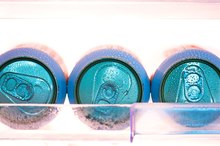What does fact checked mean?
At Healthfully, we strive to deliver objective content that is accurate and up-to-date. Our team periodically reviews articles in order to ensure content quality. The sources cited below consist of evidence from peer-reviewed journals, prominent medical organizations, academic associations, and government data.
- Nutrition, Metabolism and Cardiovascular Disease: Carbonated Beverages and Gastrointestinal System: Between Myth and Reality
- Nutrition, Metabolism and Cardiovascular Disease: Carbonated Beverages and Gastrointestinal System: Between Myth and Reality
The information contained on this site is for informational purposes only, and should not be used as a substitute for the advice of a professional health care provider. Please check with the appropriate physician regarding health questions and concerns. Although we strive to deliver accurate and up-to-date information, no guarantee to that effect is made.
Acids in Carbonated Drinks
Although the fizz of carbonated drinks can make these beverages enjoyable to drink, many carbonated beverages contain acids 2. You can find several types of acids in carbonated drinks 2. Manufacturers add some of these acids while others occur naturally in the beverages. Manufacturers use acids in carbonated drinks to give the beverages freshness and tartness specific to the drink 2.
Carbonic Acid
Manufacturers add carbonation to water by dissolving pressurized carbon dioxide gas in the water. This process causes the water to become effervescent and fizz. Manufacturers then use the carbonated water as an ingredient to make flavored carbonated drinks 2. During this process, carbonic acid forms in the water, giving carbonated water a pH between 3 and 4. Because of the strength of this acid, manufacturers often add a base such as sodium bicarbonate to reduce the acidity and neutralize the water.
- Manufacturers add carbonation to water by dissolving pressurized carbon dioxide gas in the water.
- Because of the strength of this acid, manufacturers often add a base such as sodium bicarbonate to reduce the acidity and neutralize the water.
Citric Acid
The Difference Between Citric Acid, Ascorbic Acid & Sorbic Acid
Learn More
Citric acid is a mild acid commonly associated with fruits and vegetables. Citrus fruits such as lemons and limes contain a high concentration of this acid. Citric acid also functions as a natural preservative used by manufacturers to add tartness to carbonated beverages. Many flavored carbonated beverages use citric acid to produce the right combination of sweetness and tartness in the finished beverage.
- Citric acid is a mild acid commonly associated with fruits and vegetables.
- Citric acid also functions as a natural preservative used by manufacturers to add tartness to carbonated beverages.
Phosphoric Acid
Phosphoric acid is another acid commonly added by manufacturers to carbonated beverages. Phosphoric acid produces sharp flavors in the finished beverage. This acid also acts as an anti-fungal and antibacterial by slowing the growth of molds and bacteria. Without phosphoric acid, molds and bacteria would rapidly multiply within the beverage from the sugar content.
- Phosphoric acid is another acid commonly added by manufacturers to carbonated beverages.
- Phosphoric acid produces sharp flavors in the finished beverage.
Danger of Acids in Beverages
Does Orange Juice Damage Your Teeth?
Learn More
The December 2009 issue of "Nutrition, Metabolism and Cardiovascular Diseases" reports that carbonated beverages do play a minor role in dental erosion 3. The sugars in these beverages, however, can directly damage your teeth by causing plaque that leads to cavities, which may be more harmful than the carbonation. According to a study published in the 2006 “American Journal of Clinical Nutrition,” the phosphoric acid in carbonated beverages can, over time, prevent the body from absorbing calcium. This can damage your bones and teeth by reducing the bones’ density and potentially lead to osteoporosis, and preventing calcium from keeping bones strong.
- The December 2009 issue of "Nutrition, Metabolism and Cardiovascular Diseases" reports that carbonated beverages do play a minor role in dental erosion 3.
- The sugars in these beverages, however, can directly damage your teeth by causing plaque that leads to cavities, which may be more harmful than the carbonation.
Related Articles
References
- Homemade Soda; Andrew Schloss
- Carbonated Soft Drinks; Philip Ashurst
- Nutrition, Metabolism and Cardiovascular Disease: Carbonated Beverages and Gastrointestinal System: Between Myth and Reality
- Brancaccio P, Limongelli FM, Paolillo I, D'aponte A, Donnarumma V, Rastrelli L. Supplementation of Acqua Lete® (bicarbonate calcic mineral water) improves hydration status in athletes after short term anaerobic exercise. J Int Soc Sports Nutr. 2012;9(1):35. doi:10.1186/1550-2783-9-35
- Tucker KL, Morita K, Qiao N, Hannan MT, Cupples LA, Kiel DP. Colas, but not other carbonated beverages, are associated with low bone mineral density in older women: The Framingham Osteoporosis Study. Am J Clin Nutr. 2006;84(4):936-42. doi:10.1093/ajcn/84.4.936
- Cheng R, Yang H, Shao MY, Hu T, Zhou XD. Dental erosion and severe tooth decay related to soft drinks: a case report and literature review. J Zhejiang Univ Sci B. 2009;10(5):395-9. doi:10.1631/jzus.B0820245
- Saha L. Irritable bowel syndrome: Pathogenesis, diagnosis, treatment, and evidence-based medicine. World J Gastroenterol. 2014;20(22):6759-73. doi:10.3748/wjg.v20.i22.6759
- Cozma-petruţ A, Loghin F, Miere D, Dumitraşcu DL. Diet in irritable bowel syndrome: What to recommend, not what to forbid to patients!. World J Gastroenterol. 2017;23(21):3771-3783. doi:10.3748/wjg.v23.i21.3771
- Bachus T. American Council on Exercise. 4 Easy Ways to Drink More Water. Published March 2, 2016.
Writer Bio
Jessica Jacobs is a registered dietitian and professional writer, contributing to "Fitness Magazine" since 2003. She received a B.A. in journalism from Arizona State University and an M.S. in nutrition and food sciences from the University of Texas at Austin.









